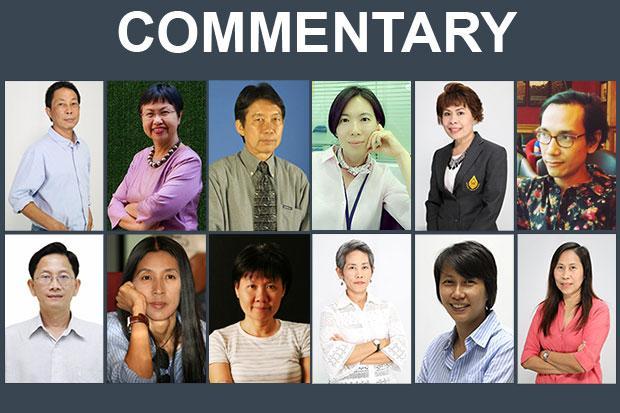
A new discussion by the Council of University Presidents of Thailand to revert academic schedules back to the old system is instructive on three levels that expose the fundamental weaknesses of Thai education, the sobering reality of the Asean Economic Community, and the top-down, patronising attitude of government over the governed.
If Thailand watchers want to know what's wrong with the country's politics and education, they can conveniently take this contested education timetable as a case in point.

Two years ago, on the apparent pretext of the AEC, the university rectors decided unilaterally without asking students and teachers to change to the Western calendar. Last year, the summer break was extended from about three to five months from March to July. The new schedule pegged the university academic year for August-May, including high summer periods in March-April.
At the same time, primary and secondary schools stuck to the old system that stymied high school students' efforts to take entrance examinations to enter university. It became a two-tier system, one academic calendar for primary and high schools and another for universities. Many high school students were left in limbo as the new university schedule played havoc with their class calendar.
The rectors have been unperturbed until recent months when high temperatures led to complaints among university students and lecturers. It simply became too hot during March-May to study for students. Many have access to air-conditioned classrooms but consequent energy consumption became another source of disenchantment because of higher costs and climate change concerns. Outside of class, in canteens for meals and common areas and corridors, the heat was palpable.
In a knee-jerk reaction, university presidents, who are accorded prominent status in Thai society and easy picks for government-related bodies, now want to consider undoing their dumb and doomed plan of going against nature just to tune in to the AEC. Had they done a thorough study, with some public hearings for student stakeholders, the feedback would have been to stick to the old system that had been determined by Thailand's climate conditions.

A young woman drinks water amid the stifling April summer heat. The Council of University Presidents of Thailand is rethinking its decision to make university students study during the summer months following complaints of unbearable conditions. Thanarak Khunton
Moreover, it is unclear whether some or all of the other Asean countries intend to adopt the Western academic calendar. Singapore is a conspicuous exception, as it has followed the Western schedule for years. But Singapore is an affluent, green and small "air-conditioned" nation. It can manage and afford to run schools and universities comfortably against natural conditions.
This is not the case with other Asean countries. The Thai university rectors never made it clear whether Asean states, all beset with tropically hot and humid conditions, will all follow the same academic calendar.
So the rectors are like a government that rules by decrees in the comfort of frigid air-conditioned meetings without ever listening to their student constituencies.
Thailand's education system has many flaws and defects. Chief among them is surely the lack of respect and rights of students. Student evaluations of teaching performance, for example, count for next to nothing in lecturers' promotions and mobility. Thai education is bureaucracy-driven, centred on rules and regulations. It is not a student-centred system with a corresponding mindset. Until students have more say in the affairs of their education with their welfare becoming central in the process, particularly at tertiary levels, Thai education reforms will go nowhere.
Part of the change of minds among rectors is also attributable to the AEC's dynamics. Now that we are just months away as opposed to a few years ago, the AEC looks less of a big deal. Economic realities in Asean countries have not changed noticeably because of the AEC. The dynamics and trends that are visible on the ground are there despite the AEC.
For example, migrant labourers from nearby countries who work in Thailand have grown in numbers because of market drivers, not the AEC. The ongoing "boat people" crisis originating from Bangladesh and Myanmar has also raised the spectre that labourers from the neighbourhood are not always welcome. The initial fad and fixation with the AEC is fading in relative terms. Now that it's coming soon, the AEC feels not so different on the ground. In areas where it could prove consequential, such as labour migration, the AEC is actually facing more regional reservations.
All that Thai university rectors need to do to realise their faddish folly is to hold two consecutive meetings without air-conditioners. Undoing the scheduling mess they have created will require squeezing future recesses but they can do so in a staggered fashion over a few years, shifting the university calendar back to the old, nature-consistent system a few weeks per year rather than all at once with no break for students.
Finally, Thailand's university rectors need to wake up and get in touch with their constituencies. They have to start thinking and seeing that university students are there to be served, not the other way around.
Thitinan Pongsudhirak is associate professor and director of the Institute of Security and International Studies, Faculty of Political Science, Chulalongkorn University.
